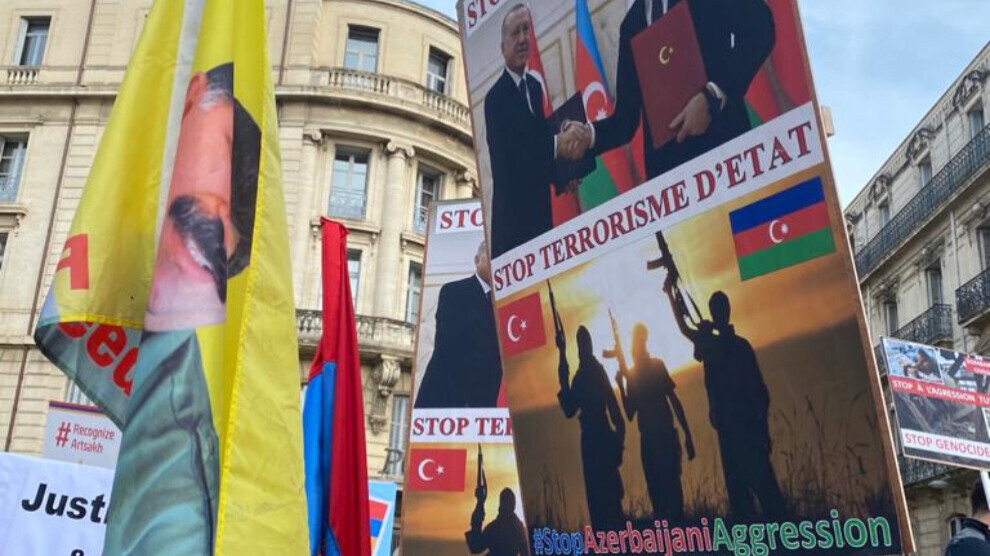Peace in Kurdistan: People of Nagorno-Karabakh want peace
Peace in Kurdistan Campaign released a statement on the continuing conflict over Nagorno-Karabakh.
Peace in Kurdistan Campaign released a statement on the continuing conflict over Nagorno-Karabakh.

Peace in Kurdistan Campaign released a statement on the continuing conflict over Nagorno-Karabakh. The statement reads: "After six weeks of fighting and several failed attempts by different parties at achieving a ceasefire, the casualties in Nagorno-Karabakh continue to rise. Reliable figures are difficult to obtain but by 22 October the Russian government estimated that over 5,000 people have been killed, with more than 2,000 Armenians and 2,000 Azerbaijanis dead."
The statement reminds that "some 90,000 people have been displaced. Stepanakert, the capital of Nagorno-Karabakh, has been targeted by cluster bombs, and 70% of its 55,200 residents have left the city. On 28 October, an Azerbaijani air strike severely damaged Stepanakert’s maternity clinic and children’s health centre. According to The Daily Telegraph (3 November 2020) Azerbaijan claims to have captured enough territory to settle 500,000 people. Armenia and the people of Nagorno-Karabakh fear a campaign of forced removal and slaughter."
Peace in Kurdistan underlines the "critical role" played by "Turkey in the conflict. Turkey has steadily supplied Azerbaijan with arms, including fighter jets and military drones. The Director of the Russian Military Intelligence Service, Sergei Naryshkin, also stated that ‘separate elements of Turkish intelligence work’ within the conflict zone.
On 5 October Canada suspended its arms trade with Turkey due to Turkey’s deployment of military drones outfitted with Canadian technology in Nagorno-Karabakh. Turkey justifies its involvement in the conflict using pan-Turkic and sectarian religious rhetoric; Azerbaijan is predominantly Turkic and Moslem, Armenia is mainly Christian. This sectarianianism has been displayed in the course of the conflict; for example, in Nagorno-Karabakh, Sushi’s historic cathedral was bombed by Azerbaijani planes. In addition, Turkey has made use of mercenaries drawn from Syria to fight with the Azerbaijani forces. According to the Syrian Observatory for Human Rights, when 342 mercenaries fled Azerbaijan to return to Syria, Turkey immediately replaced them with 230 more fighters."
The number of mercenaries in Azerbaijan and Nagorno-Karabakh now is reckoned to be approximately 2,500. Russia’s foreign ministry condemned the involvement of outside forces in the conflict and said it had received information that ‘members of international terrorist organisations are being transferred from the Middle East.’ Jihadist fighters, including from Islamic State, have been deployed by Turkey against the Kurds in Syria and Iraq, and now they are being sent to the Caucasus.
Peace in Kurdistan adds: "This development is a real threat to the security of the entire region.The danger extends beyond the Caucasus; on 1 November, the memorial in Lyon, France to Armenia’s victims of the 1915 Ottoman genocide was vandalized with pro-Turkey and pro-Erdogan inscriptions and insults about the Nagorno-Karabakh war. The perpetrators were members and supporters of the Grey Wolves, a fascist organisation linked to Turkey’s National Movement Party (MHP), which governs Turkey in alliance with the Justice and Development Party (AKP) and President Erdogan. Erdogan supporters occupied French city streets to intimidate and attack Armenians living in France."
The Grey Wolves was banned in France on 4 November. Turkey’s foreign ministry responded that ‘the decision also shows that the French government has become totally a captive of Armenian circles.’
On 5 November, French foreign minister Jean-Yves Le Drian condemned the poisonous atmosphere being created by the Turkish president: ‘Turkey is taking aggressive actions in the immediate vicinity of Europe, in particular in Libya, in the eastern Mediterranean, in Nagorno-Karabakh and in northern Iraq.
Peace in Kurdistan continues: "Now a new factor has emerged. In recent days, the tone of President Erdogan’s statement addressed to France and Europe has changed. Erdogan regularly makes statement full of hatred and violence, including against French President Macron. Paris demands that Turkey abandon such behaviour.’
The Kurdish people, Peace in Kurdistan and friends of the Kurds everywhere, have repeatedly warned that the belligerence shown by Erdogan and the Turkish government was a threat not just to the Kurds, but that it was a danger for the Middle East and the wider world. That threat is now manifest and taking a deadly toll. Peace in the Middle East, the Caucasus, the eastern Mediterranean and now Europe requires peace and justice in Kurdistan. The people of Nagorno-Karabakh require peace and self-determination."